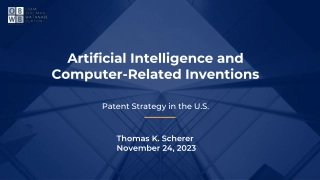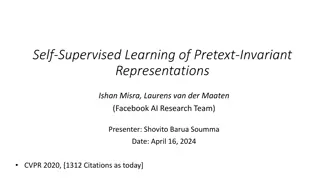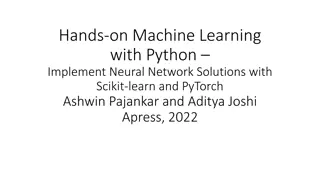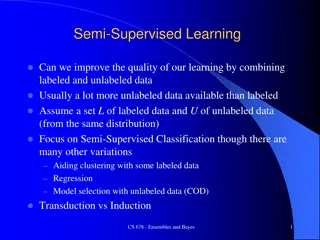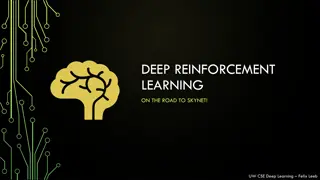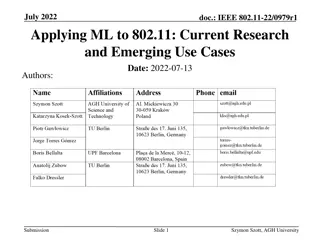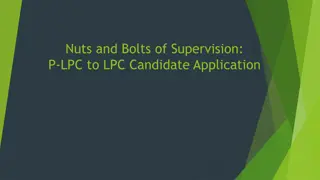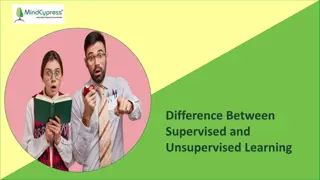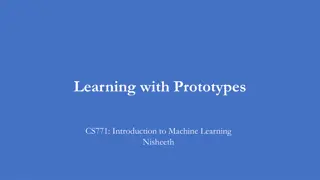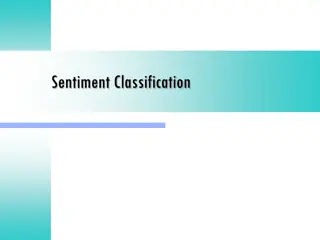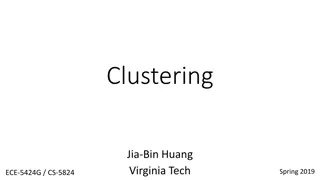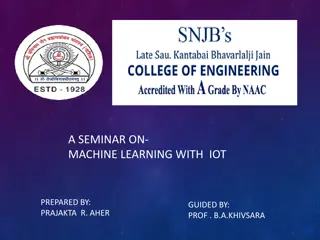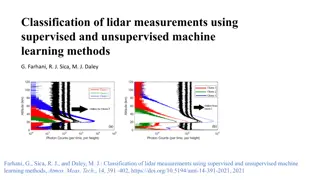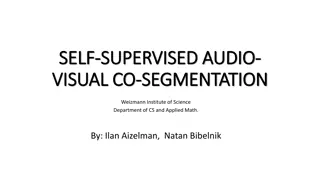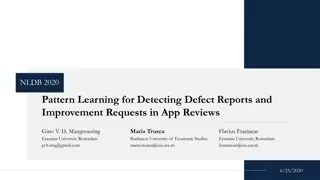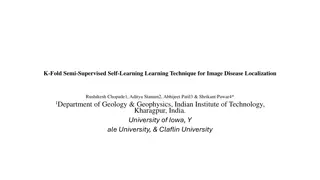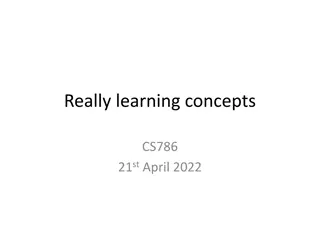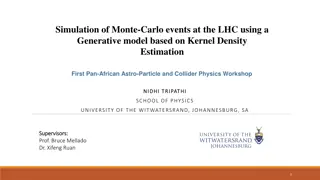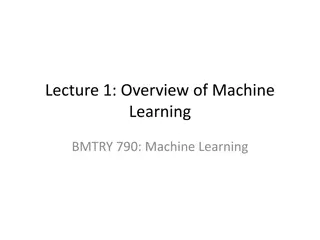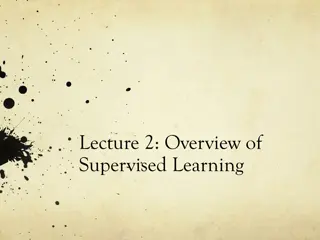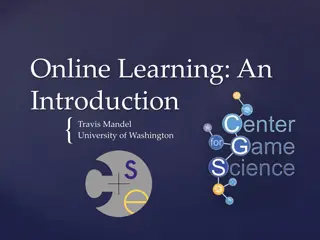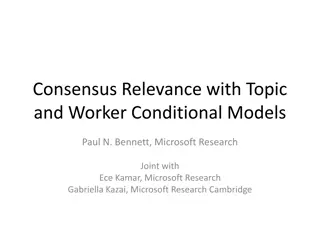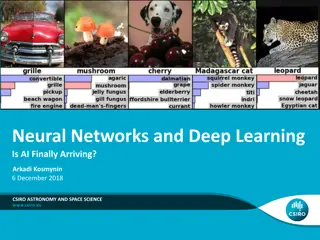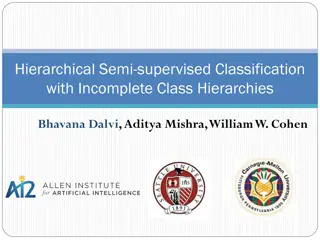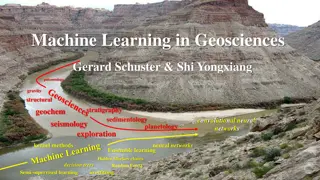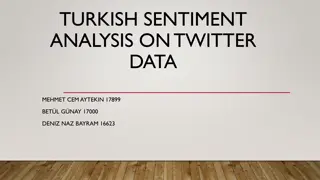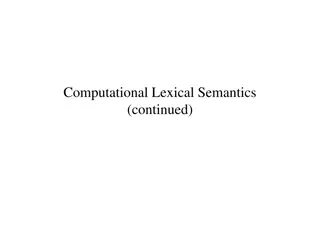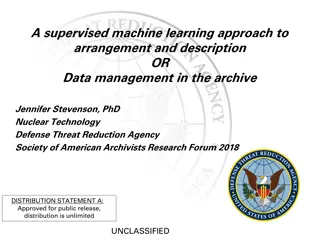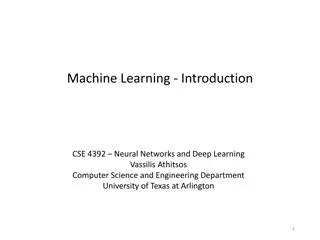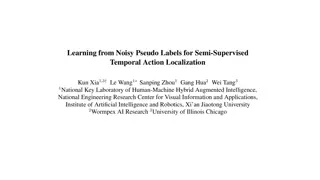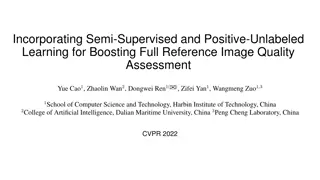Semi-Supervised Credit Card Fraud Detection via Attribute-Driven Graph Representation
Explore a novel approach for detecting credit card fraud using a semi-supervised attribute-driven graph representation. The technique leverages temporal aggregation and attention layers to automatically unify heterogeneous categorical attributes and detect fraudulent transactions without label leaka
1 views • 23 slides
Artificial Intelligence and Computer-Related Inventions
Explore the key concepts and techniques in the field of artificial intelligence (AI), including supervised learning, unsupervised learning, reinforcement learning, deep learning, and generative adversarial networks. Gain insights into the evolving definitions of intelligence in machines and the pote
4 views • 13 slides
Understanding Supervised Learning Algorithms and Model Evaluation
Multiple suites of supervised learning algorithms are available for modeling prediction systems using labeled training data for regression or classification tasks. Tuning features can significantly impact model results. The training-testing process involves fitting the model on a training dataset an
3 views • 74 slides
SUPERVISED PRACTICE IMPLEMENTATION PLAN
This presentation outlines the Supervised Practice Implementation Plan by Susan Gilbert-Hunt for occupational therapists. It covers the purpose, process overview, starting the process, and preparing for the SPIP. The plan includes finding a suitable workplace, developing effective actions, maintaini
0 views • 23 slides
Self-Supervised Learning of Pretext-Invariant Representations
This presentation discusses a novel approach in self-supervised learning (SSL) called Pretext-Invariant Representations Learning (PIRL). Traditional SSL methods yield covariant representations, but PIRL aims to learn invariant representations using pretext tasks that make representations similar for
0 views • 8 slides
Hands-on Machine Learning with Python: Implement Neural Network Solutions
Explore machine learning concepts from Python basics to advanced neural network implementations using Scikit-learn and PyTorch. This comprehensive guide provides step-by-step explanations, code examples, and practical insights for beginners in the field. Covering topics such as data visualization, N
2 views • 13 slides
Virginia Perspective 2020 State Supervised Eligibility Dashboard
The implementation of Virginia Perspective 2020, a state-supervised and locally-administered program, involves notifying staff through agency broadcasts and email alerts to detect fraud. Eligibility workers receive alerts through VaCMS Dashboard for PARIS matches, ensuring timely actions on case eli
0 views • 10 slides
Understanding Semi-Supervised Learning: Combining Labeled and Unlabeled Data
In semi-supervised learning, we aim to enhance learning quality by leveraging both labeled and unlabeled data, considering the abundance of unlabeled data. This approach, particularly focused on semi-supervised classification, involves making model assumptions such as data clustering, distribution r
1 views • 17 slides
Deep Reinforcement Learning Overview and Applications
Delve into the world of deep reinforcement learning on the road to advanced AI systems like Skynet. Explore topics ranging from Markov Decision Processes to solving MDPs, value functions, and tabular solutions. Discover the paradigm of supervised, unsupervised, and reinforcement learning in various
0 views • 24 slides
Importance of Supervised Driving for Learner Drivers
Learner drivers benefit greatly from supervised driving experiences as they help reduce crash risks, improve skills, and build confidence. The presence of a knowledgeable and authorized supervisor is crucial for enhancing road safety and developing competent drivers. This summarizes the key points d
0 views • 20 slides
Exploring Machine Learning Applications in Enhancing 802.11 Performance
This document delves into recent research on utilizing machine learning (ML) to enhance 802.11 performance, focusing on emerging use cases and the increased interest in ML applications in the field since 2019. It outlines the ML areas frequently used, such as supervised learning (SL) and reinforceme
1 views • 23 slides
A Comprehensive Guide to LPC Supervision and Application Process
Explore the nuts and bolts of supervising P-LPC to LPC candidates, including supervised experience requirements, documentation processes, submission guidelines, and application steps. Learn about reporting supervised hours, completing supervision documentation, and making recommendations for LPC can
0 views • 12 slides
Difference Between Supervised and Unsupervised Learning
If you want to learn more about supervised and unsupervised learning, you should enroll in a financial modeling training course online.
0 views • 10 slides
Introduction to Machine Learning Concepts
This text delves into various aspects of supervised learning in machine learning, covering topics such as building predictive models for email classification, spam detection, multi-class classification, regression, and more. It explains notation and conventions used in machine learning, emphasizing
1 views • 22 slides
Machine Learning Algorithms and Models Overview
This class summary covers topics such as supervised learning, unsupervised learning, classification, clustering, regression, k-NN models, linear regression, Naive Bayes, logistic regression, and SVM formulations. The content provides insights into key concepts, algorithms, cost functions, learning a
0 views • 39 slides
Understanding Sentiment Classification Methods
Sentiment classification can be done through supervised or unsupervised methods. Unsupervised methods utilize lexical resources and heuristics, while supervised methods rely on labeled examples for training. VADER is a popular tool for sentiment analysis using curated lexicons and rules. The classif
7 views • 17 slides
Overview of Unsupervised Learning in Machine Learning
This presentation covers various topics in unsupervised learning, including clustering, expectation maximization, Gaussian mixture models, dimensionality reduction, anomaly detection, and recommender systems. It also delves into advanced supervised learning techniques, ensemble methods, structured p
1 views • 37 slides
Seminar on Machine Learning with IoT Explained
Explore the intersection of Machine Learning and Internet of Things (IoT) in this informative seminar. Discover the principles, advantages, and applications of Machine Learning algorithms in the context of IoT technology. Learn about the evolution of Machine Learning, the concept of Internet of Thin
0 views • 21 slides
Innovative Learning Management System - LAMS at Belgrade Metropolitan University
Belgrade Metropolitan University (BMU) utilizes the Learning Activity Management System (LAMS) to enhance the learning process by integrating learning objects with various activities. This system allows for complex learning processes, mixing learning objects with LAMS activities effectively. The pro
4 views • 16 slides
Classification of Lidar Measurements Using Machine Learning Methods
This study focuses on classifying lidar measurements using supervised and unsupervised machine learning methods. By utilizing machine learning, specifically supervised learning, the researchers trained a prediction function to automatically label unlabeled lidar scans. They conducted steps to implem
0 views • 16 slides
Exploring Self-Supervised Audio-Visual Learning for Segmentation Tasks
Researchers from the Weizmann Institute of Science delve into the realm of self-supervised audio-visual learning for segmentation tasks, leveraging the correlation between visual and audio events to jointly train networks for enhanced understanding. Motivated by the potential of unsupervised learnin
0 views • 44 slides
NLDB 2020 Pattern Learning for Detecting Defect Reports and Improvement Requests
This research paper focuses on automatically learning patterns to detect actionable feedback in mobile app reviews, specifically identifying defect reports and improvement requests. The main goal is to develop a mechanism that can effectively classify feedback types using both manual and learned pat
0 views • 17 slides
Enhancing Image Disease Localization with K-Fold Semi-Supervised Self-Learning Technique
Utilizing a novel self-learning semi-supervised technique with k-fold iterative training for cardiomegaly localization from chest X-ray images showed significant improvement in validation loss and labeled dataset size. The model, based on a VGG-16 backbone, outperformed traditional methods, resultin
0 views • 5 slides
Understanding Conceptualization in Machine Learning
Discussion on two types of representations (Propositional, Non-propositional) and the role of similarity in categorizing stimuli. Exploring supervised and unsupervised categorization methods, along with the capabilities of conceptualization beyond classification and clustering. Comparison of human a
0 views • 21 slides
Machine Learning and Generative Models in Particle Physics Experiments
Explore the utilization of machine learning algorithms and generative models for accurate simulation in particle physics experiments. Understand the concepts of supervised, unsupervised, and semi-supervised learning, along with generative models like Variational Autoencoder and Gaussian Mixtures. Le
0 views • 15 slides
Introduction to Machine Learning in BMTRY790 Course
The BMTRY790 course on Machine Learning covers a wide range of topics including supervised, unsupervised, and reinforcement learning. The course includes homework assignments, exams, and a real-world project to apply learned methods in developing prediction models. Machine learning involves making c
0 views • 62 slides
Overview of Supervised Learning in Regression and Classification
Dive into the fundamental concepts of supervised learning through regression and classification methods. Explore the differences between regression and classification, understand input vectors, terminology of variables, performance evaluation criteria, and optimal prediction procedures. Discover the
0 views • 45 slides
Understanding Online Learning in Machine Learning
Explore the world of online learning in machine learning through topics like supervised learning, unsupervised learning, and more. Dive into concepts such as active learning, reinforcement learning, and the challenges of changing data distributions over time.
0 views • 49 slides
Consensus Relevance with Topic and Worker Models
Study focuses on recovering actual relevance of a topic-document pair using noisy predictions from multiple labelers. Various supervised, semi-supervised, and unsupervised approaches are explored. The goal is to obtain a more reliable signal from the crowd or benefit from scale through expert qualit
0 views • 15 slides
Evolution of Machine Learning and Deep Learning in AI
Exploring the evolution of machine learning and deep learning in artificial intelligence through neural networks, with insights on supervised, unsupervised, and reinforcement learning. Learn about recommended resources like Java Weka and Python scikit-learn for data mining tasks. Delve into advancem
0 views • 16 slides
Hierarchical Semi-Supervised Classification with Incomplete Class Hierarchies
This research explores the challenges and solutions in semi-supervised entity classification within incomplete class hierarchies. It addresses issues related to food, animals, vegetables, mammals, reptiles, and fruits, presenting an optimized divide-and-conquer strategy. The goal is to achieve semi-
0 views • 18 slides
Machine Learning in Geosciences and its Applications
Explore the intersection of machine learning and geosciences, covering topics like paleontology, gravity, structural stratigraphy, geochemistry, sedimentology, convolutional neural networks, seismology, planetology, exploration, kernel methods, ensemble learning, and more. Delve into the three major
0 views • 6 slides
Implementing Turkish Sentiment Analysis on Twitter Data Using Semi-Supervised Learning
This project involved gathering a substantial amount of Twitter data for sentiment analysis, including 1717 negative and 687 positive tweets. The data labeling process was initially manual but later automated using a semi-supervised learning technique. A Naive Bayes Classifier was trained using a Ba
0 views • 17 slides
Understanding Word Sense Disambiguation in Computational Lexical Semantics
Word Sense Disambiguation (WSD) is a crucial task in Computational Lexical Semantics, aiming to determine the correct sense of a word in context from a fixed inventory of potential word senses. This process involves various techniques such as supervised machine learning, unsupervised methods, thesau
0 views • 67 slides
Supervised Machine Learning for Data Management in Archives
In this study by Jennifer Stevenson, a supervised machine learning approach is proposed for arrangement and description in archives, specifically focusing on the DTRIAC collection which contains a vast amount of historical documents related to nuclear technology. The aim is to expedite the catalogin
1 views • 15 slides
Understanding Machine Learning: Types and Examples
Machine learning, as defined by Tom M. Mitchell, involves computers learning and improving from experience with respect to specific tasks and performance measures. There are various types of machine learning, including supervised learning, unsupervised learning, and reinforcement learning. Supervise
0 views • 40 slides
Handling Label Noise in Semi-Supervised Temporal Action Localization
The Abstract Semi-Supervised Temporal Action Localization (SS-TAL) framework aims to enhance the generalization capability of action detectors using large-scale unlabeled videos. Despite recent progress, a significant challenge persists due to noisy pseudo-labels hindering efficient learning from ab
0 views • 30 slides
Cutting-Edge AI and Computer Vision Projects Supervised by Prof. K.H. Wong
Delve into the fascinating world of deep neural network research, computer vision for Google Glasses, and computer music research in these exciting MSC projects supervised by Prof. K.H. Wong. Explore the possibilities of face recognition, speech recognition, text translation, tourist navigation, and
0 views • 5 slides
Boosting Image Quality Assessment through Semi-Supervised and Positive-Unlabeled Learning
Incorporating Semi-Supervised and Positive-Unlabeled Learning methods enhances full-reference image quality assessment using less expensive unlabeled data and exclusion of negative samples. The framework involves PU learning with CE and NE losses, as well as SSL with MSE loss for labeled data and ps
0 views • 13 slides
Understanding Supervised Agricultural Experience Programs (SAEPs) in Agriculture Education
Supervised Agricultural Experience Programs (SAEPs) are structured experiences outside of regular classes that provide hands-on learning in agriculture. SAEPs aim to offer diverse career exploration opportunities, skills development, and recognition for individual achievements. They come in differen
0 views • 11 slides

